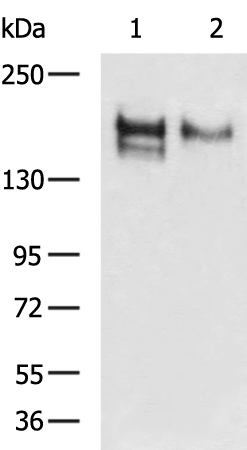
| WB | 咨询技术 | Human,Mouse,Rat |
| IF | 咨询技术 | Human,Mouse,Rat |
| IHC | 咨询技术 | Human,Mouse,Rat |
| ICC | 技术咨询 | Human,Mouse,Rat |
| FCM | 咨询技术 | Human,Mouse,Rat |
| Elisa | 1/5000-1/10000 | Human,Mouse,Rat |
| Aliases | M130; MM130; SCARI1 |
| WB Predicted band size | 125 kDa |
| Host/Isotype | Rabbit IgG |
| Antibody Type | Primary antibody |
| Storage | Store at 4°C short term. Aliquot and store at -20°C long term. Avoid freeze/thaw cycles. |
| Species Reactivity | Human, Mouse |
| Immunogen | Synthetic peptide of human CD163 |
| Formulation | Purified antibody in PBS with 0.05% sodium azide and 50% glycerol. |
+ +
以下是关于CD163抗体的3篇代表性文献及其摘要内容:
1. **文献名称**:*CD163 as a biomarker of macrophage activation in inflammatory diseases*
**作者**:Etzerodt A, Moestrup SK
**摘要**:该文献综述了CD163作为巨噬细胞特异性标志物的功能,强调其通过抗体检测在炎症性疾病(如动脉粥样硬化、类风湿性关节炎)中的表达变化,以及与炎症消退过程的关联。
2. **文献名称**:*Tumor-associated macrophages express CD163 in colorectal carcinoma via prostaglandin E2*
**作者**:Hassel JC et al.
**摘要**:研究通过CD163抗体染色发现,结直肠癌组织中肿瘤相关巨噬细胞(TAMs)高表达CD163.且其表达受前列腺素E2调控,提示CD163可能成为肿瘤微环境治疗的靶点。
3. **文献名称**:*CD163+ macrophages control viral encephalitis by restricting viral replication and immune pathology*
**作者**:Terry RL et al.
**摘要**:利用CD163抗体标记巨噬细胞亚群,研究发现CD163+巨噬细胞在病毒性脑炎中通过抑制病毒复制和减轻过度免疫反应发挥保护作用,为抗病毒治疗提供新思路。
以上文献均聚焦CD163抗体在疾病机制研究和临床诊断中的应用,涵盖炎症、肿瘤及感染领域。
CD163. a member of the scavenger receptor cysteine-rich (SRCR) superfamily, is a transmembrane glycoprotein predominantly expressed on monocytes and macrophages, particularly the M2 anti-inflammatory macrophage subset. It functions as a hemoglobin-haptoglobin scavenger receptor, playing a critical role in clearing free hemoglobin released during hemolysis and mitigating oxidative tissue damage. This anti-inflammatory activity links CD163 to immune regulation and resolution of inflammation.
CD163 antibodies are widely used in research to identify and isolate M2 macrophages, aiding studies on their roles in diseases like cancer, atherosclerosis, and autoimmune disorders. In cancer biology, CD163+ tumor-associated macrophages (TAMs) are associated with immunosuppression and poor prognosis, making CD163 a biomarker for tumor microenvironment analysis. Additionally, soluble CD163 (sCD163), shed during inflammation, serves as a serum biomarker for macrophage activation in conditions such as sepsis, viral infections, and liver diseases.
Therapeutic applications of CD163 antibodies are under exploration, including targeting M2 macrophages to modulate immune responses or deliver drugs. However, challenges remain in understanding tissue-specific CD163 functions and balancing its protective versus pathogenic roles. Overall, CD163 antibodies are vital tools for investigating macrophage biology and developing diagnostic or therapeutic strategies in inflammation and cancer.
×